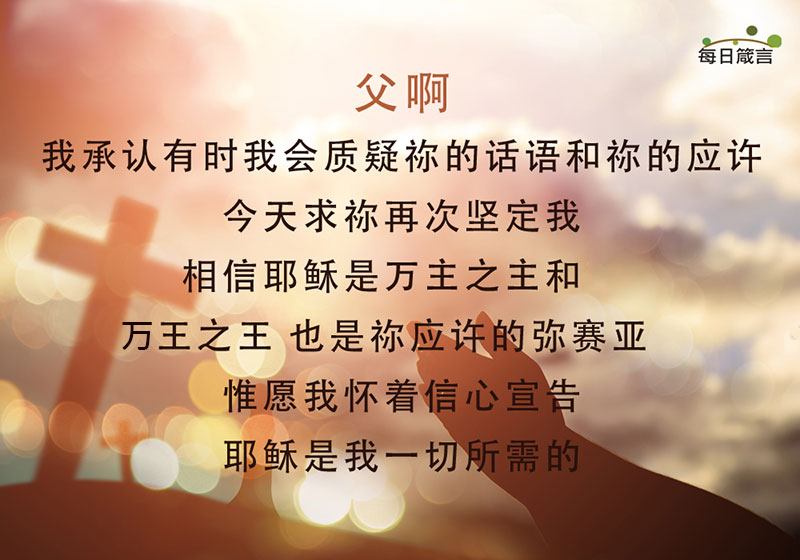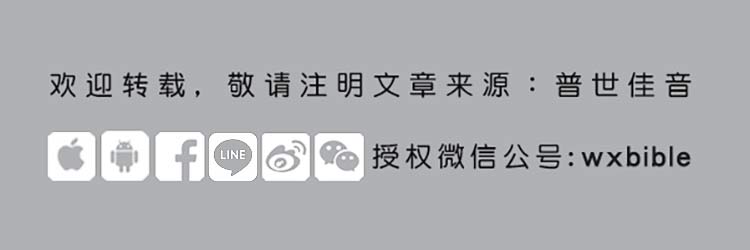

对二十一世纪今天的人来说,新约圣经应验了旧约圣经的这个看法,似乎有点牵强。对,撒迦利亚书11章和马太福音27章都提到三十块银子,它们固然有些相似的地方,但同时也有很多不同之处;在新约圣经中,把三十块银子丢在圣殿的是犹大,而不是牧羊人。那么,撒迦利亚书的这段经文,是否真的是指着耶稣说的呢?
读今天这两段经文时,我们肯定留意到它们之间相似的地方。我们也知道,整本圣经都是神所默示的 (提摩太后书3:16-17),而写圣经的目的,就是让我们可以从中学习、使我们得福,并叫我们相信神。
耶稣独特的地方,是祂应验了旧约圣经每一类文学作品中的预言。在历史的记载中,耶稣大过摩西、约书亚、大卫,和以利亚;耶稣应验了众先知的预言;在关于君王弥赛亚的诗篇和描述受苦仆人的诗歌中,我们也清清楚楚看见耶稣。
每当我们读旧约圣经时,我们都看见它在预表那位将会赐救恩给我们的耶稣。整本圣经是一个完整的故事,耶稣是我们一切所需的。就让“耶稣是我们一切所需的”,成为我们今天的信仰宣言。
父啊,我们承认有时我们会质疑祢的话语,和对祢的应许感到疑惑。今天求祢再次坚定我们,相信耶稣是万主之主和万王之王,也是祢应许的弥赛亚。惟愿我们怀着信心宣告:“耶稣是我们一切所需的。” 奉祂的名祷告,阿们。

撒迦利亚书 11:7-13; 马太福音 27:3-10
7于是,我牧养这将宰的群羊,就是群中最困苦的羊。我拿着两根杖,一根我称为“荣美”,一根我称为“联索”。这样,我牧养了群羊。
8一月之内,我除灭三个牧人,因为我的心厌烦他们;他们的心也憎嫌我。
9我就说:“我不牧养你们。要死的,由他死;要丧亡的,由他丧亡;余剩的,由他们彼此相食。”
10我折断那称为“荣美”的杖,表明我废弃与万民所立的约。
11当日就废弃了。这样,那些仰望我的困苦羊就知道所说的是耶和华的话。
12我对他们说:“你们若以为美,就给我工价。不然,就罢了!”于是他们给了三十块钱作为我的工价。
13耶和华吩咐我说:“要把众人所估定美好的价值丢给窑户。”我便将这三十块钱,在耶和华的殿中丢给窑户了。
3这时候,卖耶稣的犹大看见耶稣已经定了罪,就后悔,把那三十块钱拿回来给祭司长和长老,说:
4“我卖了无辜之人的血是有罪了。”他们说:“那与我们有什么相干?你自己承当吧!”
5犹大就把那银钱丢在殿里,出去吊死了。
6祭司长拾起银钱来,说:“这是血价,不可放在库里。”
7他们商议,就用那银钱买了窑户的一块田,为要埋葬外乡人。
8所以那块田直到今日还叫做“血田”。
9这就应了先知耶利米的话,说:“他们用那三十块钱,就是被估定之人的价钱,是以色列人中所估定的,
10买了窑户的一块田;这是照着主所吩咐我的。”
“Everything must be fulfilled that is written about me in the Law of Moses, the Prophets, and the Psalms.” — Luke 24:44
For 21st-century people today the fulfillment of Old Testament texts in the New Testament may seem a bit farfetched. Yes, there are some similarities in the references to 30 pieces of silver in Zechariah 11 and Matthew 27. But there are also many differences. In the New Testament it is Judas and not the shepherd who throws thirty pieces of silver into the temple. So, does Zechariah really point to Jesus in this passage?
As we read these passages today, we certainly can note the similarities in them. And we know that the entire Bible has been inspired by God (see 2 Timothy 3:16-17) and written for us to learn, to be blessed, and to believe.
What is unique about Jesus is that he fulfills every type of literature in the Old Testament. Jesus is greater than Moses, Joshua, David, and Elijah in the historical literature. Jesus fulfils the predictions of the prophets. Jesus is clearly visible in both the messianic kingly psalms as well as the suffering-servant songs.
Wherever we are reading in the Old Testament, we can see that it points forward to the One who has provided salvation for us. The whole of Scripture is one story. Jesus is all we need. So let that be our confession today: “Jesus is all we need.”
Father, we confess that from time to time we question your Word, and we wonder about your promises. Reassure us today that Jesus is Lord of lords and King of kings, the promised Messiah. And may we confess, “Jesus is all we need.” Amen.
诵读: 楚云
片头: 张妙阳

